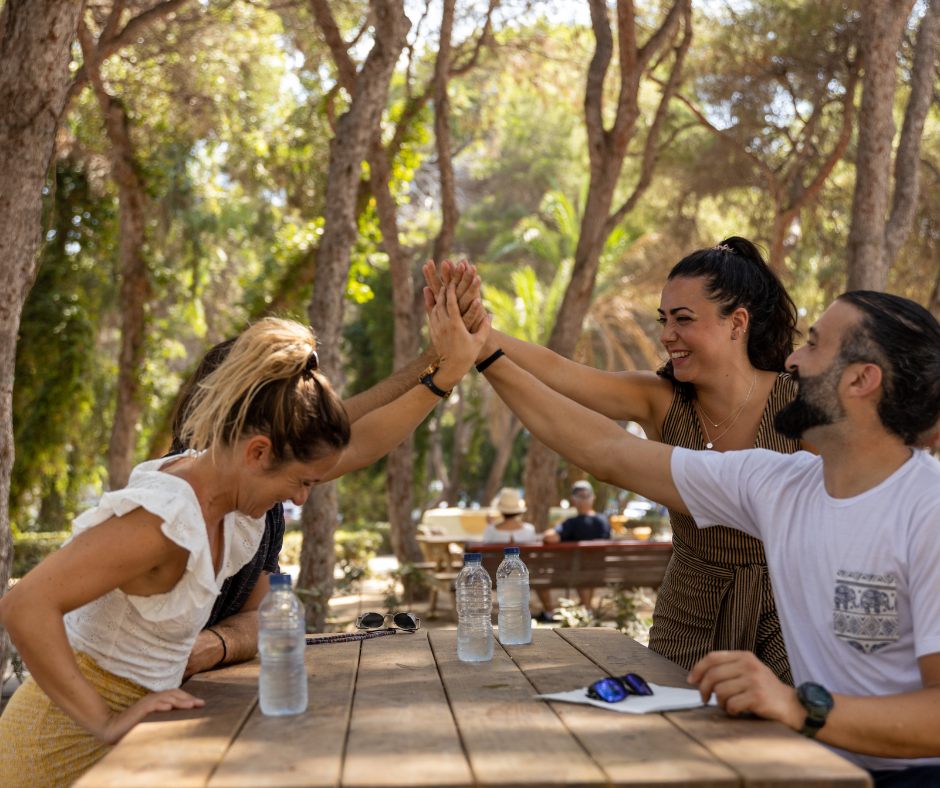Why You’re Zoning Out With Friends And What Burnout Has to Do With It
The Night Out That Feels… Off
You’re sitting at dinner with friends. The conversation is light, the food is great, the vibes are good — and yet, your mind keeps floating elsewhere. You keep nodding, smiling, half-laughing, but you’re not really there. You catch yourself zoning out mid-sentence, or worse, wondering if it’s rude to leave before dessert so you can go collapse in your bed.
And the thing is: nothing’s wrong. But something feels off.
Sound familiar?
Welcome to the world of social disconnection caused by burnout — a phenomenon that’s more common than most of us realize.

When Burnout Sneaks Into Your Social Life
We often talk about burnout in the context of work — the emails, the deadlines, the endless to-do lists. But burnout doesn’t clock out when you do. It follows you into your weekends, your hangouts, even your downtime.
If you’re constantly exhausted, emotionally spent, and mentally foggy, it makes sense that your brain would struggle to stay present. Socializing, even with people you love, requires energy — and if your tank is running on fumes, you may find yourself checking out even in the middle of a conversation.
When Your Ears Are Listening but Your Mind Isn’t
Have you ever nodded along to a conversation, only to realize you didn’t process a single word? You weren’t being rude — you were likely experiencing cognitive withdrawal, where your ears register the sound, but your brain skips the meaning.
This often happens when:
- You’ve been multitasking all week and your brain refuses one more input
- You’re overstimulated by background noise — clinking glasses, laughter, phones buzzing
- You’ve hit your “social absorption limit” and need mental silence, not more data
It’s not just about introversion. It’s about bandwidth. Even if you're naturally outgoing, burnout lowers your threshold for sound, speech, and social nuance.

When Rest Doesn’t Feel Restful Anymore
Burnout doesn’t always go away just because you slept in or cancelled plans. In fact, one of its weirder symptoms is that even rest starts to feel like work. You might:
- Feel guilty for not making the most of your downtime
- Sit in silence and still feel overstimulated
- Take naps but wake up more disoriented than refreshed
This explains why you might zone out during a quiet dinner — your brain never really turned off, even when you were “resting.” Recharging takes more than rest. It requires real decompression, where your body, mind, and social self can all reset.

Signs You’re Experiencing Social Burnout
Not sure if what you’re feeling is burnout? Here are some subtle clues that your exhaustion might be affecting your ability to connect:
- You find yourself zoning out mid-conversation
- You're hyper-aware of how long the interaction is lasting
- You go out but feel emotionally unavailable the entire time
- You’re going to bed early and still waking up tired
- Socializing feels like a chore, not a joy
- You crave connection but feel detached even while in it
Burnout can look like not caring — but deep down, you care so much that your system had to shut down to survive.

The “Time Loop” Feeling
One of the sneakiest signs of burnout is the groundhog day effect:
You wake up tired, go to work tired, come home tired, eat, scroll, crash, and repeat. Even your “fun” activities start to feel like obligations. You go out for dinner and realize you’re counting down to when you can go home.
Everything blends together. Days bleed into nights, and social plans feel like blips in a foggy routine.
This isn’t laziness. This isn’t rudeness. This is your body and brain waving a white flag.
Why Your Brain Zones Out (The Science-y Bit)
Zoning out isn’t laziness. It’s not rudeness. And it’s definitely not proof that you’re a bad friend, partner, or person. More often than not, zoning out during social situations — especially when you’re burnt out — is a protective neurological response from a system that’s overloaded and under-supported.
Let’s dig into what’s really going on under the hood.

Your Prefrontal Cortex Needs Rest, Too
The prefrontal cortex is the part of your brain that handles executive functioning: attention, planning, working memory, decision-making, social awareness, and impulse control. When you’re well-rested and regulated, this part of your brain helps you stay present and respond with intention.
But burnout changes the equation.
When you're chronically stressed, your brain reallocates resources away from higher-level thinking and toward survival mode. The prefrontal cortex becomes sluggish or even goes partially offline. This is when you might find yourself:
- Struggling to follow conversations
- Repeating yourself or asking the same questions twice
- Staring into space mid-meal or mid-sentence
- Forgetting what you were just about to say
It's not that you're not trying. It's that your brain is conserving energy for the basics — and social engagement isn't one of them when you're in survival mode.

10 Therapist-Approved Ways to Stay Connected When You’re Burnt Out
When burnout drains your energy, socializing can feel overwhelming. These strategies help you nurture your relationships gently without pushing yourself beyond what feels manageable.

1. Check In With Yourself Before Making Plans
Before agreeing to hang out, take a moment to honestly assess how much energy you have — physically, emotionally, and mentally. Burnout isn’t just about feeling tired; it impacts your social capacity too. If you notice you’re already stretched thin, it’s okay to say no or ask to reschedule. Resisting the fear of missing out (FOMO) is key here. True friends will understand that showing up as your authentic self, even if it means taking a break, is more important than forcing yourself into exhaustion. Protecting your nervous system should always come first, because burnout left unchecked makes socializing harder, not easier.
- Consider journaling or simply pausing to check in: “How am I really feeling about this plan?”
- Practice setting boundaries by gently communicating your limits.
- Remind yourself that declining an invite now can mean better connection later.

2. Choose Low-Stimulation Hangouts
Loud bars, crowded parties, or noisy group events can overwhelm your senses when you’re burnt out. Instead, opt for low-key, calming environments where your nervous system can stay regulated. This might look like a walk in a quiet park, a cozy coffee shop, or a relaxed dinner at home. Shared activities that don’t demand constant talking—like watching a movie, cooking together, or simply sitting side-by-side—can provide meaningful connection without draining your energy.
- Look for places with natural light and soft sounds to help soothe your system.
- Consider activities that allow for silence or gentle background conversation.
- Suggest small gatherings over large groups to avoid overstimulation.
3. Be Honest About Where You’re At
You don’t owe anyone a detailed explanation, but offering a simple heads-up about your current energy level can be freeing. Saying something like, “I’m feeling pretty wiped today, so I might be quieter than usual,” lowers the pressure to perform or fake enthusiasm. This kind of honesty invites compassion and makes space for your friends to adjust their expectations. Vulnerability is a powerful tool for deepening intimacy, even in small doses.
- Practice brief, clear phrases to communicate your needs.
- Notice how your friends respond — true connection honours your truth.
- Use honesty as a way to protect your boundaries without guilt.

4. Schedule Buffer Time After Socializing
Burnout recovery requires intentional downtime. Avoid packing your schedule with back-to-back events; instead, build in buffer zones where you can rest and recharge. After socializing, give yourself at least 30 minutes of quiet space to decompress. This might mean lying down, meditating, or simply sitting in stillness. Recognize that rest isn’t wasted time — it’s essential nervous system care that helps you show up more fully when you are with others.
- Set reminders on your calendar to block off transition time.
- Practice gentle activities during these breaks, like stretching or breathing exercises.
- Protect this buffer time fiercely to avoid slipping back into overwhelm.
5. Practice Mini Grounding Tools During Hangouts
It’s common to feel your attention drift or your body tense during social events when burnt out. Having subtle grounding tools on hand can help you reconnect to the present moment without needing to leave. Try quietly touching a textured object, such as a bracelet or fabric, and take slow, deep belly breaths while listening. Alternatively, press your feet firmly into the floor to feel more anchored. If you need a quick break, excusing yourself to the washroom for a moment of regulation can be a helpful reset.
- Keep a small grounding object in your pocket or bag.
- Practice breath awareness in a way that feels natural, not distracting.
- Use sensory anchors like scent or gentle movement to soothe your system.

6. Reconnect Through Senses, Not Just Words
Sometimes the pressure to maintain conversation is what feels most draining. Instead, lean into sensory-based connection with your friends. Share a warm drink or meal together, sit quietly in nature, or watch a comforting show side-by-side. Sensory experiences can create a sense of closeness and safety without requiring constant verbal engagement. This approach honours your energy limits while still fostering meaningful bonds.
- Use sensory activities to invite calmness and presence.
- Suggest low-demand shared experiences that invite relaxation.
- Notice how nonverbal connection can be just as powerful as words.
7. Let Go of Performance Mode
Burnout often pushes you into “performance mode” where you feel the need to be entertaining, upbeat, or always “on.” But connection doesn’t require you to perform. Let yourself show up exactly as you are, even if that means being quiet or low-energy. Remember, your worth in relationships isn’t tied to how entertaining or engaged you appear. Simply being present, even in silence, is enough.
- Practice self-compassion by releasing perfectionism around socializing.
- Affirm to yourself that your presence alone has value.
- Experiment with staying fully present without the need to impress.

8. Watch Out for “Should” Language
Burnout can make your inner voice full of “shoulds” — “I should go out even though I’m tired,” or “I should stay longer because they expect me to.” These thoughts often come from guilt or obligation rather than genuine desire, and they invite deeper exhaustion. Notice when you’re pushed by “should”s and try to reframe those as choices rather than rules. Real connection happens when you engage because you want to, not because you feel forced.
- Keep a journal of “should” thoughts to increase awareness.
- Practice rephrasing “should” to “I choose to” or “I don’t want to right now.”
- Use these insights to prioritize self-care over external expectations.
9. Focus on Small Moments of Presence
You don’t need to be fully engaged for the entire social event to maintain connection. Instead, focus on small moments of genuine presence. Listen carefully to one story, ask one thoughtful question, or share one honest sentence about how you’re feeling. These micro-moments add up and allow you to engage sustainably when your energy is low.
- Identify moments that feel meaningful and lean into them.
- Practice active listening in short, manageable bursts.
- Share brief but authentic reflections to maintain connection.

10. Redefine What Quality Time Looks Like
Burnout shifts what “quality time” means. It may no longer be about deep conversations or high-energy activities. Quality time might be sitting together in comfortable silence, sharing a quiet laugh, or simply being near someone who doesn’t need anything from you. Allow yourself to redefine connection on your own terms — this flexibility can make socializing feel less daunting and more nourishing.
- Experiment with new ways to share time that feel gentle and safe.
- Notice how different types of presence still fulfill relational needs.
- Give yourself permission to set new norms for connection.
You’re Not “Bad at Socializing” …You’re Just Tired
The next time you catch yourself zoning out during a conversation, gently remind yourself:
This is not a personal flaw. This is your body asking for recovery.
Burnout doesn't always show up as tears or tantrums. Sometimes it looks like feeling foggy, distant, or disconnected while doing something you normally enjoy. And while it’s tempting to push through — especially to keep up appearances — the real work is slowing down, tending to your needs, and allowing yourself to come home to yourself first.

At KMA Therapy, We Get It
Burnout doesn’t just affect your work life. It shapes your relationships, your energy, and how safe you feel being seen. At KMA Therapy, our team of compassionate, trauma-informed therapists helps you make sense of the exhaustion, reconnect with your nervous system, and rebuild a life that feels sustainable — not performative.
You deserve friendships that feel nourishing.
You deserve rest without shame.
And you deserve to show up in your relationships without leaving yourself behind.
Let’s get you back to yourself — one gentle step at a time.






